#also really jarring to see canon V when i have such a specific view of Vee in my head lmao
Text

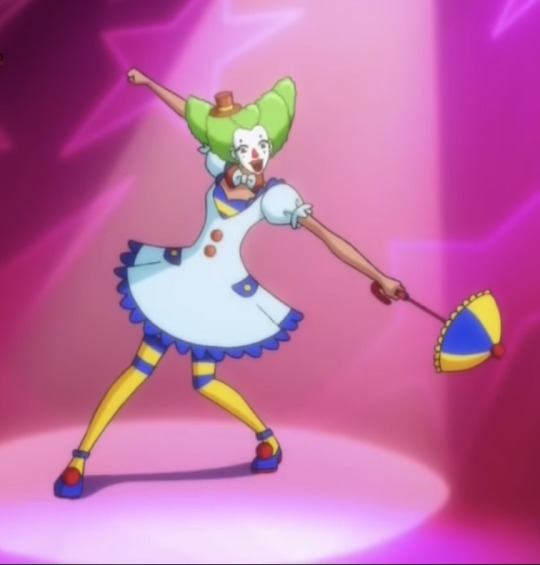
V(ee) in the gameplay vs V(ee) in the narrative.
#cyberpunk 2077#Im out here laying an army flat with nothing but a pistol#then i just get...punched?#and it lays me flat?#bruh#also really jarring to see canon V when i have such a specific view of Vee in my head lmao
30 notes
·
View notes
Note
Can you try explain what you mean about Ocelot looking like a drag king in mgsv? I feel like your boyfriend in that I just. Don't see it? I'm trying to understand why Ocelot would even have that applied when he's always been just A Guy™
Okay so I'm going to try to do this without getting into Grad-Level 5D Queer Theory Media Criticism, but I also fully realize that in doing that, a lot of this is going to sound very much like I'm saying "Source: Just Trust Me Bro".
(anon i am SO sorry that you happen to be the first person to directly adress me about gender in MGS)
I also wanna be straight up front here and say that I'm not trying to imply that Ocelot is anything other than a guy, he's just also a guy who's playing a million roles (this is important) and lying to damn near everyone, including himself. He has some of the worst identity issues I've ever seen in a character, and that comes to a head in 4 where he literally isn't even *Ocelot* until the final moments of his life. So yes, for the sake of not writing War and Peace, I'm going to assume Ocelot is "just a guy" and come at this from a pure queer theory/media analysis standpoint, not a headcanon one.
So first it's really important to point out the order in which we see Ocelot through the series. In the timeline, the last time we see Ocelot before V is 3 (or PO which I haven't played due to its placement in canon-limbo, but Ocelot looks basically the same). So we see him go from A to B here.

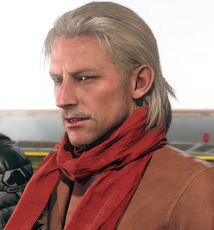
I am going to say something potentially controversial: even before saw V ocelot, I thought 3 Ocelot looked like he was wearing drag *queen* makeup. I don't know whether it's intentional, or an attempt to circumvent the lower poly models and lower definition textures of the PS2, but the first image looks like someone who is going for a highly exaggerated, feminine cheek contour. Here's a few drag queens who, imo, do a very similar contour look:
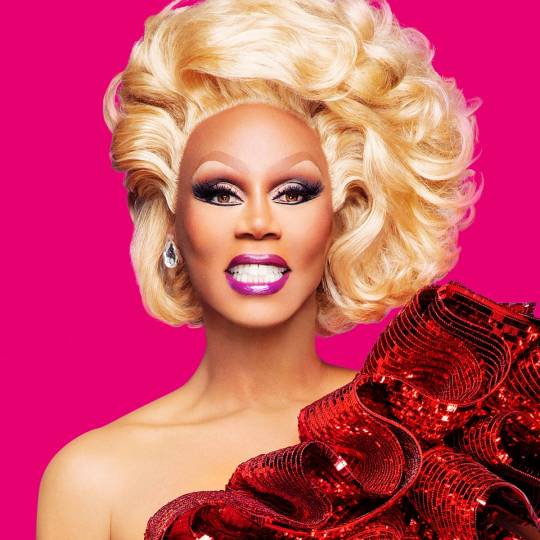

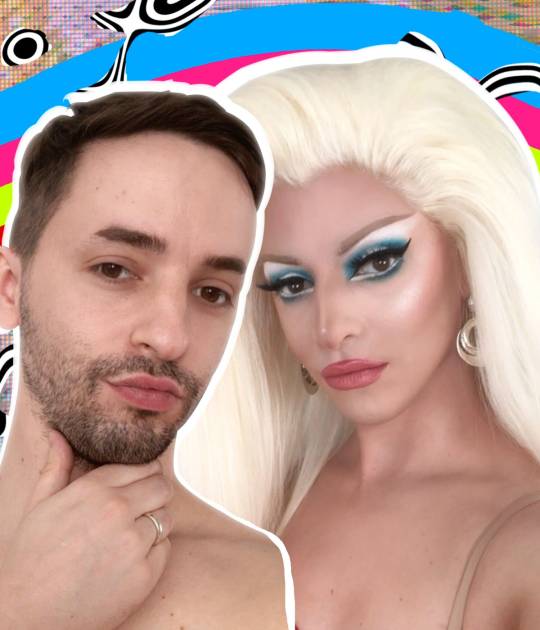
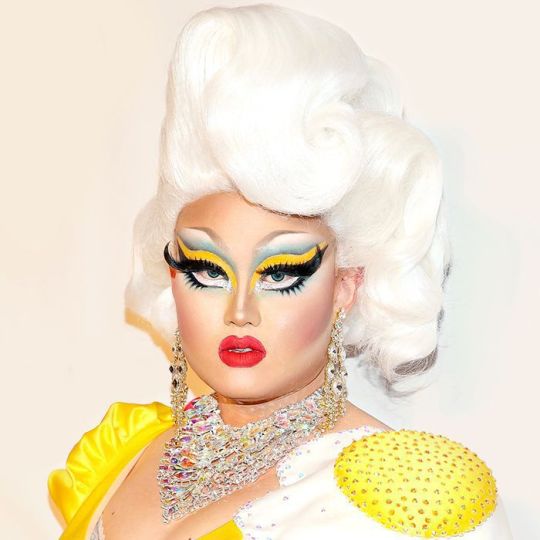
Whether the color filter or the texturing of the PS2 or something else, the MGS3 version of Ocelot also has a look of mascara and frosted lipgloss (frosted lips being much more popular at the time of MGS3's original release than today, but alas).
So from that I was already very much primed to look for femininity in Ocelot's whole vibe. It was actually kind of jarring how much more rugged he is in V than in any of the previous games, to the extent that it sent up alarm bells in my head that something was going on.
I don't remember the moment that I went "hey, wait a minute," but it was certainly pretty early on. As someone who's been on tumblr a hella long time and remembers when we used to swap passing tips, the specific combination of facial features remind me of a very specific genre of "ftm makeup tutorials" that were also pretty contemporarily popular on tumblr. A very quick summary being mascara on the eyelashes and specific peach fuzz to give the impression of a squarer jaw and having more facial hair, as well as specific contouring to give a "masculine cheekbone." Most of these tips basically came directly from drag king makeup.
Gonna include some drag kings as well, some things to notice include the tendency towards using stubble as contouring and vice versa, the shaping of cheek contouring, and the tendency to accentuate mustache and sideburns.
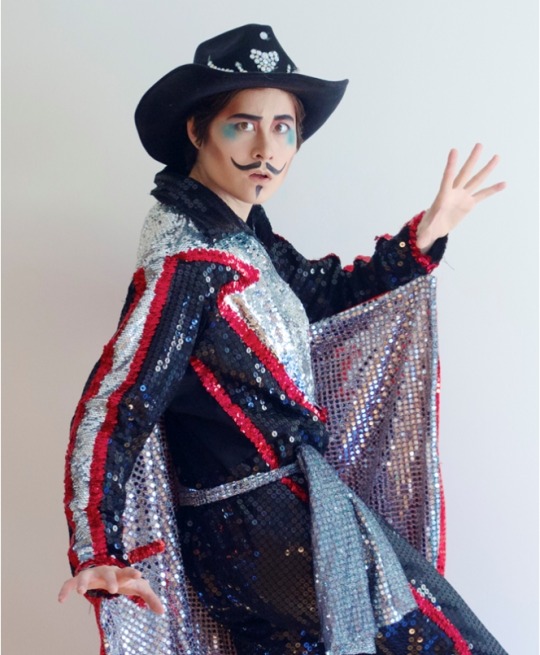

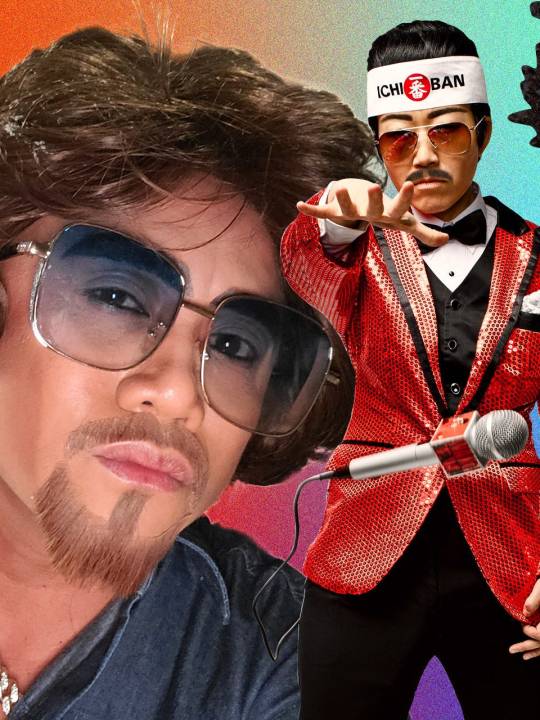

I'm pretty bad at wording descriptions of hair and makeup so you'll have to forgive me for not going ham on explaining the similarities bc now we actually get to the interesting part which is: so fucking what? If this is true, if you take my word for it, what does it say about the text? If I want to make this argument to someone else, what can I say that will convince them that, even if it's not *intentional,* it's a valid and meaningful view of his character?
Like, you can make a character based on anything you want, but why does it matter whether Ocelot is based on drag either direction?
Ocelot's "drag"iness is multipurpose. One: he's queer. Like, I grant that he never comes out and says "I love 'Big "Naked 'John' Snake" Boss'" but we get a hell of a lot more confirmation that he's gay than we get straight confirmation for a lot of presumed-straight characters. I feel comfortable saying he's canon queer.
Two: it's a visual metaphor for being a double/triple agent. While he's literally performing several roles (KGB/GRU/CIA, or MSF/Real BB/US, or US/Patriots/BB, or anything in between), he's also visually playing two (or more) gender roles, a feminine man, a mannish woman, something neither or in-between. The implication of drag specifically is pretending to be something that he isn't (which he literally always is, holy shit, again, does he even know who he realiy is?).
And before anyone says "Well, if it's so important to his character, why did they wait until 3 to start doing it?" They didn't!!

This is THE most classically masculine that Ocelot ever looks. But there's still precious polygons invested into giving him long hair and a flowing coat. Working with sprites and low-poly models means having to very carefully select traits that you want to display on your character, and Ocelot's go into making him a cringefail cowboy.
The fact that he's a cowboy in itself is also pretty important to the whole gender/sexuality situation. I mean, Brokeback Mountain might not have been out yet, but the male-to-female ratio in the west meant a lot of men cozied up together on the frontier. Hell, hankey code comes from cowboy culture, with men wearing certain colors to announce who would take the "man" or "woman" role while square dancing.
I could go a lot into gender and how it works on a social/societal level in general and why that matters, but OOPS I have been writing this for a WHILE.
I was actually going to go a lot more into queer theory and gender in MGS in general but ngl, I could write a whole doctoral thesis on gender and how different characters perform or subvert gender. Because holy shit when you start peeling back the very thin macho facade of Kojima's work to do a feminist reading of it, boy howdy do you get. A whole lot to talk about. (ask me about death stranding sometime i dare you)
Basically what I'm trying to get across is that Ocelot has a lot of roles that he's playing and NOT playing, and more than a few of those are gender roles, which is very much visually symbolic of his character.
I am so sorry anon I have been thinking about him nonstop for a full year </3 I hope at least the first part of this answered your question about what features I see that scream drag to me.
#also i want to be SUPER clear that transvestigating real people would be fucked up#its always morally correct to transvestigate revolver ocelot#mgs#mgsv#mgs3#mgs1#ocelotposting#revolver ocelot#my analyses#analysis or something
27 notes
·
View notes
Text
true happiness is so neeeeaaaar
a special thanks to @bethanyactually for reading this over and @notbang for talking some of this out with me. 💖
During my latest watch of Crazy Ex, I kept an eye out for the first time each character breaks into song without Rebecca present or directly involved. It’s well-covered ground that her arrival in West Covina sent ripples through our cast of characters. Inspired by Rebecca’s pursuit of happiness, they started asking themselves—consciously or subconsciously—what would make them happiest. So when does each of them adopt her musical lens, and how does the song they sing inform their journey toward happiness?
Greg – Not surprising considering he wears his unhappiness on his sleeve, Greg is the first one to break into song without Rebecca in episode 1.06 with “What’ll It Be?” The song isn’t really a revelation because there’ve been plenty of hints at just how dissatisfied he feels with his life. Greg hates West Covina (as evidenced by him telling Rebecca it’s not a compliment that she’s starting to fit in around town) and he hates the circumstances that he feels keep him from making any meaningful changes (at the party in the first episode he wastes no time complaining to Rebecca about missing out on Emory because of his sick dad).
Still, “What’ll It Be?” acts as Greg’s thesis statement for that unhappiness. Despite knowing exactly what it is that’s causing his unhappiness, he feels powerless to change it, instead blaming outside forces for keeping him in his current situation. “Hey, West Covina, look what you’re doing to me.”
The unfortunate part is that Greg himself is actually the largest obstacle standing between him and happiness: not his dad, not his job, and not the people of West Covina. His dad, while he seems to appreciate Greg’s presence and care, has clearly decided he’s going to pursue his vices instead of actually maintaining his health. Since he doesn’t actually need to be looked after—he’s made the conscious choice to be unwell—he gives up Greg pretty easily when the time comes in 2.02. Though Greg asserts that he’s going to be upset by his leaving, Marco’s behavior (i.e. chastising Greg for wasting his savings on him because he was supposed to use it for school) actually point to the fact that he’d be happy to see his son leave even back in 1.06.
As for his job, yes, all food service professions suck on a certain level, and Greg’s certainly not getting rich for the drudgery he has to endure. However, in 1.06, we see that Greg’s attitude is really what makes the job such a drag. Kevin, his boss, is in fact a pretty understanding and amiable guy. He takes feedback well and genuinely wants his employees to succeed. The fact that Greg feels so smothered there has as much to do with how he approaches the situation as it does the nature of the job itself.
Finally, the people of West Covina/the town itself only seem like they’re keeping Greg trapped because he actively dismisses and looks down on it all. In reality, the people he associates with most closely—White Josh, Hector, Rebecca, and again, even his father—actively encourage Greg to make changes with an eye toward pursuing business school, as well as call him out on his most destructive behaviors. It’s just that Greg can’t take their encouragement at face value because he’s dwelling on the negativity in his life and can’t seem to break that habit.
Of course, alcoholism plays its part in the unhappiness equation, and that’s no small thing. But, again, that’s something Greg has to deal with and overcome internally. It has little to do with his external circumstances, as the Greg who’s singing “What’ll It Be?” would have us believe.
It makes sense, then, that when he finally takes ownership of his hand in his own shitty situation, he’s able to break the pattern and actually pursue the career of his choosing. He removes himself from the environment that tempts him back into stasis and takes control of his life. No longer feeling powerless, Greg is at least on the path to knowing happiness.
Paula – Paula’s the next one to get caught up in the music with “His Status is Preferred” from 1.07. On the surface, this song seems like a trite expression of unhappiness, of simply wanting a more exciting life, but, as we know, the situation’s a lot more nuanced than we think.
During the course of season one, it becomes clearer and clearer that Paula’s over-involvement in Rebecca’s pursuit of Josh has more to do with her than it does Rebecca and Josh being genuinely good for each other. I believe 1.03 is the first time we see Paula and Scott interact and boy is it uncomfortable. Scott is distracted, Paula’s passive-aggressive, and the kids are a mess.
The further we move into the show, the more we understand Paula’s state of mind. She’s been raised to believe that starting a family is the most important thing she’ll ever do (“My dad was right, I’m a breeder not a leader”), but she feels very disconnected from both her kids and her husband. Part of the reason is that she thinks she missed out on her fairy tale romance, so how is anything she actually built supposed to compare to that? On some level, Paula’s always living in a fantasy realm where everything worked out with Jeff and she’s truly happy.
It should be pointed out, though, that while Jeff gives Paula’s yearning for something different a face, the problem itself is not specifically that man. Any fantasy would do in keeping Paula from fully accepting how her real-life relationship played out. In point of fact, Calvin fills that role here in 1.07. He’s just another expression of Paula chasing a fantasy to avoid dealing with her reality.
As such, Paula’s just as much a product of the damaging “patriarchal love narrative” as Rebecca. The notion that real and true love is all about the spark, that it’s a force of nature you can’t possibly fly in the face of, that it’s something easy and all-consuming keeps her from doing the hard work necessary to maintain a relationship with her husband and family. And, because she feels the spark with Calvin, she gets caught up in the fanciful notion that being with him will make her feel happy, important, and valued — “My whole life has been stuck in economy, I have waited and waited to someday be upgraded, to spread my wings and fly…”
Of course, we have Rebecca swoop in and point out that Paula’s pursuit of Calvin isn’t an authentic or healthy remedy to her true unhappiness before anything regretful happens. Because it’s Rebecca imposing her own revelation on Paula though, this is far from the last time the issue comes up. At this point, Paula hasn’t learned the lesson herself, and she needs to fumble a little more before she does.
We still haven’t seen the final resolution to this conflict, and I don’t think there will be one scene or moment that wraps it up with a nice bow. Deep-seated issues like Paula’s unhealthy relationship to what it means to be a mother and a wife don’t simply go away. 3.07 showed us that she’s mindful of what her patterns are, but we have yet to see evidence that the work is being done to avoid falling back into them. She’s finally let go of the fantasy, but that doesn’t mean she’s ready to feel content with reality.
Valencia – In 1.09, Valencia is the next character to break out into song by herself with “Women Gotta Stick Together.” When I first sat down to write this meta, the fact that Valencia was the third most affected by Rebecca’s pursuit of happiness seemed surprising. They have such a complicated, antagonistic relationship at this point, it’s kind of jarring to imagine Rebecca having a hand in connecting Valencia with her happiness.
Upon further reflection though, it makes perfect sense. Valencia has constructed a life that makes her so deeply unhappy, of course Rebecca swooping in and going after the foundation on which Valencia’s built her on-paper fantastic life would bring all her dissatisfaction to the surface. “Women Gotta Stick Together,” then, is Valencia’s acknowledgement of everything that keeps her feeling trapped, just buried under a few layers of satire and subtext.
You see, Valencia is a classic case of how female socialization teaches us to view all other women as threats because we’re competing for male attention, and this perceived competition has kept her from truly connecting with other women. However, as we know from her interactions with Rebecca in 1.02 and her eager initiation into the #GurlGroup4Evah, Valencia actually craves female friendship above all else. She regrets losing her high school friends because she was given male attention instead of them (read: sexually assaulted, yikes). She is willingly wooed by the potential relationship with Rebecca even though she was clearly skeptical about ulterior motives. And she throws herself into the group activities—embracing everything from going to the bathroom in pairs to awkward sex toy parties with vigor.
So, even though she’s using satire to mask it, Valencia definitely desires the picturesque, supportive relationships she describes in the beginning of the song: “Females helping females for the greater good. Sisters helping sisters, that’s called sisterhood.” Unfortunately, at this point, she’s also unable to get past her compulsion to attack and belittle every other woman with the end goal of proving she’s the most desireable.
It should also be noted that Valencia’s wholehearted acceptance of the competition narrative is born of her need to ignore her attraction to other women. Though I personally think Valencia’s coming out arc was a travesty because it was handled so poorly, it still confirms in canon that her relationship with Josh was a big, honking example of a woman struggling with compulsory heterosexuality. For evidence, look to V’s 2.05 speech about how she knew the relationship was dead a long time ago—she felt it necessary to keep pushing this relationship forward without love and affection from Josh because a) love and affection was not actually what she wanted from any man and b) she feared having to adapt to the change and examine her life if her and Josh broke up, forcing her closer to the truth that she’s a lesbian—and the scene between Valencia, Josh, and Beth in beginning of 3.12 where it’s revealed that Valencia had a problem with Josh touching her but has no such reservations when it comes to Beth.
That being said, her constant putting down of other women and their appearances functions as a way for Valencia to distance herself from her attraction. It’s easier to remain locked in competition and criticize other women’s bodies than it is to accept her attraction. (Valencia’s clear overcompensation is the reason it’s totally OOC for her coming-out process to be easy and easily glossed over.) But, of course, without acknowledging her true self, Valencia can never be truly happy with her relationships.
Finally, “Women Gotta Stick Together” hints at the unhappiness Valencia feels trying to live under the pressure to look physically appealing to men. There are clear mentions throughout the series of Valencia’s disordered eating (in 1.06 with the “I’ve been starving since 1998” line and plenty of dialogue in 2.05 and 2.07, to name just a few examples). Not only is she overcompensating for her attraction to women by dissecting their appearance, she’s overcompensating for her clear discomfort with her own body by building herself up in relation to how much skinnier she is than her “competition.” Not only is she starving her physical body of sustenance, she’s starving herself of the chance to be content.
Darryl - In 1.10—consequently, right after he spends time with Rebecca socially for the first time by crashing her bus trip to the beach—Darryl gets his solo number. “Having a Few People Over” is far from the deepest song the show’s ever done, but it is still a very clear statement of Darryl’s unhappiness.
The man is obviously lonely, and he tries way too hard to manufacture interpersonal relationships he feels will assuage his loneliness. He’s constantly pushing a friendship with Paula despite her implicit and explicit desire not to have one. He inserts himself into Rebecca and Paula’s private conversations because he wants so desperately to be involved. In 1.10, he hires a bunch of escorts so the guys won’t be bored enough to bail on the evening. He even goes so far as to bully Maya because he sees the same unflattering desperation in her.
And the fact that he tries so hard, that he uses flashy bells and whistles to attract people to him, shows a deep dissatisfaction with who he is at his core. Darryl doesn’t think that his personality, alone, is enough to earn the bond and acceptance of friendship. He feels he has to dress up his company in something fancy—like, say, an EDM song—to be good enough.
Because this is such a consistent character trait of his, I was disappointed with the framing of his season three storyline. At this point in his life, Darryl has forged more meaningful bonds than he had before with White Josh and the people at Whitefeather. I wish the writers had taken the opportunity to let Darryl explore why he still felt so unhappy with his interpersonal relationships, gone more of a “if I still feel lonely with WhiJo around, if i feel like I need to manufacture a more serious relationship with a baby, what would it actually take for me to find happiness?” route.
Heather - Heather is just about the last person to break into song without Rebecca present with “Don’t Settle for Me” in 1.13. As possibly the most self-examined character on the show, her expression of unhappiness has nothing to do with internal conflict. Instead, she expresses dissatisfaction with her situation. Heather knows her worth, and won’t allow Greg to keep them both in a relationship if he’s not being honest about his intentions.
Interestingly enough, though Heather has an identity crisis in season three because she likes being a student, the arc of her conflict centers on her not knowing what the world has to offer her besides the opportunity to learn. While the character feels unmoored from her identity, she still approaches the situation with a kind of self-assuredness everyone else lacks. Her unhappiness in season three, again, has more to do with external circumstances than deep-seated emotional trauma or hangups.
And it’s fitting, then, that the resolution to this specific storyline is that Heather creates her own place in the world. She sees an opportunity and takes the chance to become gainfully employed at a job that still allows for creative expression through the various hobbies and special interests she wants to pursue.
Josh - Pretty much for the opposite reason as Heather, Josh is the last main cast member to get his own musical number with 1.17’s “Angry Mad.” The reason he’s so late to join everyone else in their examination of unhappiness is because Josh is typically pretty satisfied. He’s not looking for any deeper meaning or purpose. All his conflict in season one is surface stuff, like feeling too adult to celebrate Christmas.
And even when he does start to feel unhappy about something—i.e. losing Rebecca’s affirming attention and affection when her focus shifts to Greg—he doesn’t have the self-awareness to really explore what’s at the root of that emotion. He’d rather not acknowledge or face the problem head-on. As a result, “Angry Mad” expresses that Josh is unhappy because he’s unhappy instead of taking a closer look at why seeing Rebecca with Greg makes Josh uncomfortable.
This inability to take stock of his life definitely bites Josh in the ass more than once. It’s what gets him in over his head with Rebecca in season two. It’s what leads him to leave Rebecca on their wedding day instead of calling off the wedding (or perhaps never proposing in the first place). It’s what stops Josh from taking action to halt his downward spiral in season three because the poor oaf doesn’t even realize he’s spiraling until it’s too late.
That being said, season three did a major disservice to what little interiority the character had. I hope season four regains some focus when it comes to Josh, and he’s at least set on the path toward understanding himself and his needs better.
Nathaniel - Finally, we have our late-comer Nathaniel. It takes him eight episodes to get a solo without Rebecca being there with the 3.03 number “I Go to The Zoo.” This puts him right between Paula and Valencia in terms of how long it took Rebecca to influence his worldview enough to get him breaking into song.
Not surprising considering he’s one of the most emotionally stunted characters, his big number is essentially about retreating into childhood comforts when he’s feeling upset. The thing is, while Nathaniel’s trying to find solace in the simplicity, his upbringing is also the source of his unhappiness. His withholding parents never gave him the tools he needed to process his feelings and deal with them healthily. The effects of this have reached well into his adult life as he seems incapable of forming lasting, meaningful bonds with any person—from his disinterest and mistrust of long-term relationships in season two to his series of dick moves with Mona in season three.*
Even his interactions with Rebecca, the person who he confesses makes him want to be better at feeling his feels, lack authenticity eighty percent of the time. His confession of love in 3.04 is an inarticulate mess that devolves into a tangle of misused cliches. He’s clearly working off the Patriarchal Love Narrative, trying to be the definite-article Love Interest, instead of allowing himself to have a genuine moment with Rebecca. In the season finale, their duet is, at least on one level*, a big long joke about how little progress Nathaniel has actually made in accessing his emotions and feeling more empathetic.
Though he’s made progress toward being more open—look to the final scene of 3.06 or even his confessions during the masquerade—he still can’t seem to consider how his actions or emotional needs might affect others. Once, he might have considered this machiavellian approach to interpersonal relationships a strength. Now that he’s found some people he really wants to form lasting emotional bonds with, though, it’s the weakness that’s standing between him and happiness.
*I’d like to clarify that I’m not trying to make the argument that Nathaniel’s upbringing in any way justifies his behavior, especially when it comes to the affair, but it does give us at least a better understanding of his motivations, a clearer lens through which to view the character.
And I think that’s another important element of Nothing is Ever Anyone’s Fault. While taking empathy for people’s trauma to the extreme makes it almost valueless and a mockery of itself, the ability to understand why people behave the way that they do is fundamental to liking any of the characters on this show. The line that you have to walk, then, becomes messy and complicated, but it makes for a truly fascinating look at human nature.
#crazy ex girlfriend#crazy ex meta#greg serrano#paula proctor#valencia perez#darryl whitefeather#heather davis#way too badass to be someone you settle for#josh chan#nathaniel plimpton#yes i gave my meta a cutesy title#what of it?#also#now i can stop talking about how i should finish my crazy ex happiness meta#because BAM#i finally actually did it
85 notes
·
View notes